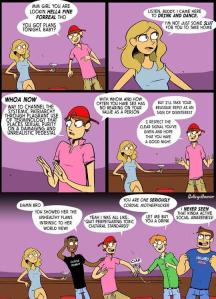J had passed along these two articles a couple weeks ago, and because of my deluge of school reading, I just read them this week:
Does My Virginity Have a Shelf Life?
and
In Hookups, Inequality Still Reigns
So many points I want to make. But the main takeaways from both for me were:
-Debra Herbenick rocks. Definitely check out her blog, My Sex Professor. Her point in the second piece about why we are so focused on women’s orgasms, if women aren’t as focused on orgasms themselves, is spot on to me. If orgasm is important to someone, and they aren’t satisfied with their current sexual relationships and encounters because they aren’t having orgasms, then it could be rich to explore that. Otherwise, what’s the fuss?
-This also points to a larger lack of sexual intelligence in our culture. Orgasm does not equal sexual perfection. Yes, orgasms are pleasurable and connecting and relaxing and cathartic. But not having an orgasm does not necessarily mean that the sex was unsatisfying, unwanted, or otherwise negative.
-The first piece left me a bit speechless (a rarity, really). I felt sad and shocked reading it. Not because virginity is sad to me, but because a lack of sexual intelligence is sad to me- it points to a lack of sexual education and self awareness, pieces that everyone deserves to cultivate and benefit from. The author seems clear on defining virginity as no PIV sex, and it seems like she has engaged in other kinds of sexual acts with partners. Why is the penetrative PIV act the epitome of virginity? Who does that serve? In this instance, it seems that the concept has done a pretty big disservice to the author, creating discomfort and insecurity, and perpetuating an idea of “the soul mate” for whom she can finally give up her (PIV) V-card.
-I had a (woman) customer at work this past weekend, who was so fabulous at differentiating at different types of virginity.
“Yeah, this guy I’m dating is a threesome virgin. Crazy, right?!”
“What about a private dance? I’m a lap dance virgin!”
I appreciated my conversation with her so much, and even more so after I read the above articles.
It adds richness to our lives to broaden our definitions of what sex is, of what being sexual means. Have different definitions for “virgin.” Know why you hold onto certain definitions, dig into them. Try being sexual without reaching orgasm to experience a different range of your sexuality. Let me know your thoughts on the above articles; there’s a lot there to chew on.

